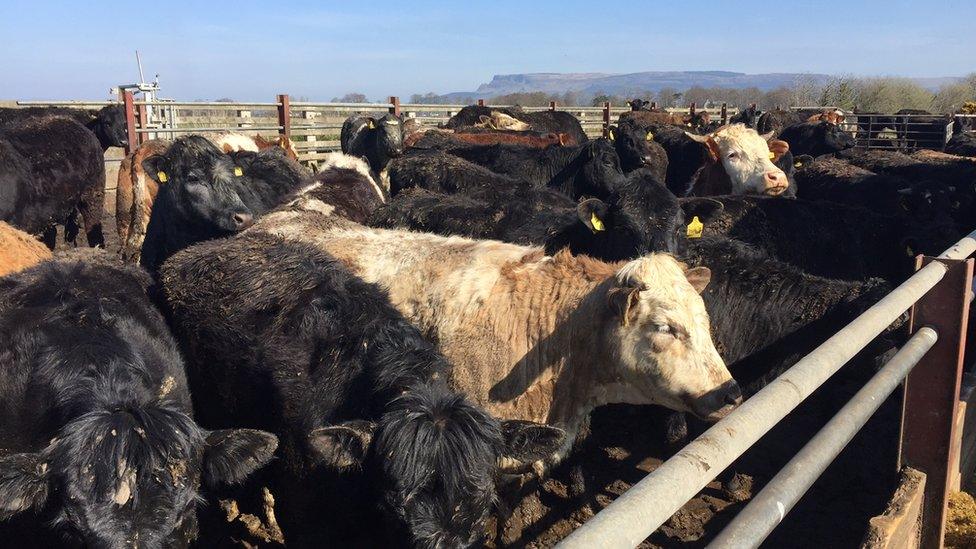Brexit: NI sheep farmers express tariff fears
- Published
- comments
How are sheep exported across the Irish border?
Half of Northern Ireland's sheep are exported to the Republic of Ireland for slaughter every year - the process can be time-consuming but is relatively seamless.
But how will Brexit affect that trade?
BBC News NI followed lambs from County Antrim to a processing plant in County Meath to find out how the multi-million pound trade works.
One-by-one, the farmers turn off a country road and into a haulier's yard in Ballycastle in County Antrim.
There's a clear view of Rathlin Island to focus attention as they wait for their turn to offload.
It's a process they're all familiar with - some have been doing it up to three times a week for over a decade.
The farmers' cooperative facilitates the direct export of sheep to processing plants in the Republic of Ireland.
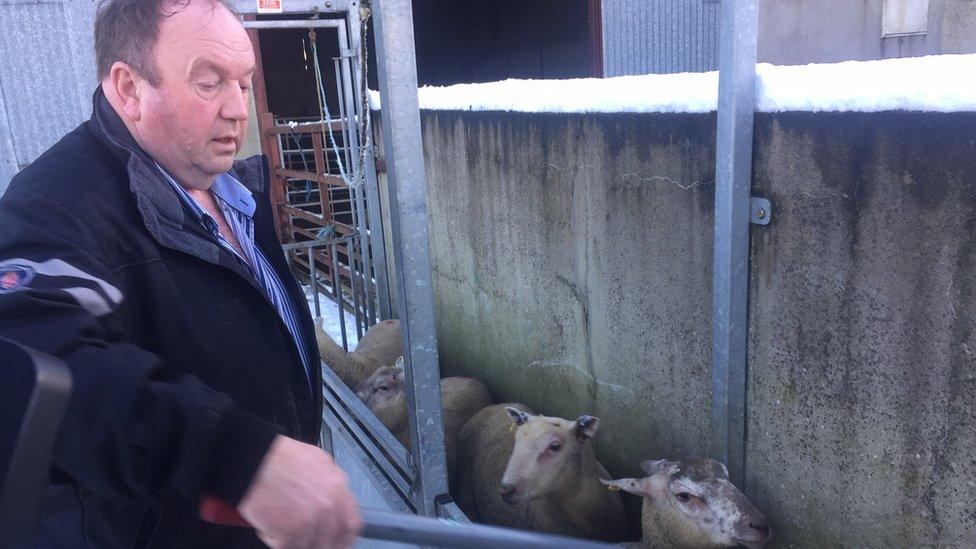
Seamus Black plays a key role in sheep checks prior to export
Seamus Black's yard in the coastal town is just one of 63 permanent EU-approved export assembly centres in Northern Ireland.
That status means livestock can be put through the required checks on-site and exported directly.
Although not a farmer himself, Seamus plays a pivotal role in the process.
'Electronic border'
Once offloaded, he electronically scans a tag on the animal's ear - the data is then added to an online system, informing authorities in Belfast, Dublin and Brussels that it will soon cross the border.
The group is coordinated by Victor Chestnutt, the deputy president of the Ulster Farmers' Union.
He describes the system as an "electronic border in action".
"It frustrates me when people say it's a free border," he says.
"Livestock either coming from the south to the north, or the north to the south - this is the process that has to take place.
"The thing that will stop the trade is the tariffs - there's just no room in the sheep industry.
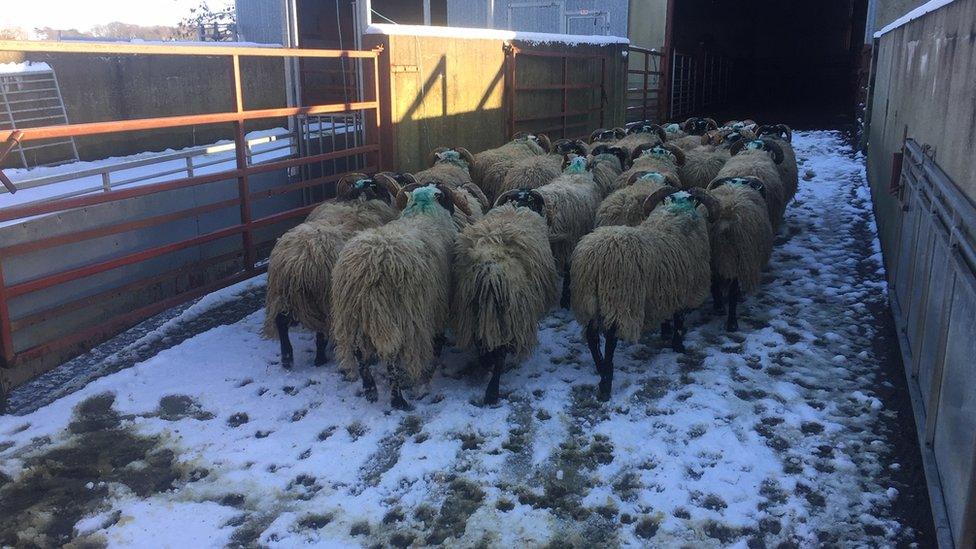
Exporting is essential because there is not enough demand for lamb meat in NI, says farmer John McLaughlin
"Sheep farmers aren't making a huge amount, especially beef and sheep farmers.
"If there are tariffs to be paid at WTO rates, sheep will become unprofitable and if farmers continue to keep them they will go broke, so sheep will disappear from our countryside."
Ronnie Duncan, who helps to organise the exports, believes tariffs would make sheep farming "unfeasible".
He estimates that farmers would have to pay about £43 to £44 on a lamb worth £95.
Lamb exports
There are a number of reasons why farmers choose to export lambs to the Republic of Ireland, including the price they get for the animal.
But according to the group's organisers there is also insufficient capacity to process all of Northern Ireland's lamb in local plants.
John McLaughlin farms near Bushmills in County Antrim - for the past few years he has exported all of his lambs for processing in the Republic of Ireland.
He echoes Victor's concerns that if that trade was to stop it would have significant impacts on farmers as there is simply not enough demand for lamb meat in Northern Ireland.
"Any extra cost, on top of production cost, is going to hit farming and business in all directions," he says.
"It's tight enough margins as it is without tariffs being brought in so an open border in that respect is the only answer for me."
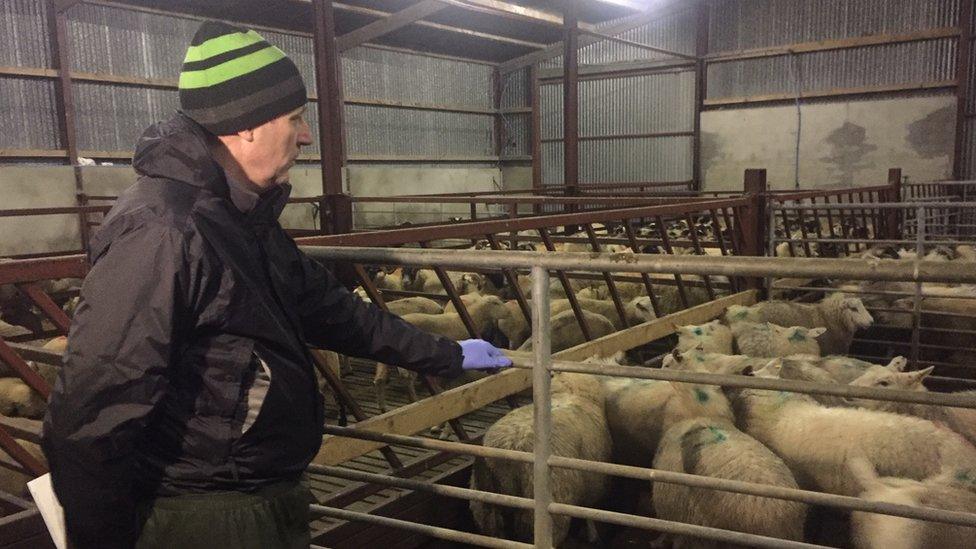
Sheep are inspected by vet Jimmy McBride before they are exported
The sheep are ferried into separate pens after scanning, ready for a final inspection by vet Jimmy McBride before the journey south begins.
As well as checking that they are in good physical health, he'll fill out and review the final paperwork.
He believes the current process gives "100% traceability".
Almost five hours after the first farmer arrived, the truck finally pulls out of the yard and into the darkness with 496 sheep on-board.
It is the tail-end of the season so numbers are down - at peak times the group could send upwards of 1,000 sheep across the Irish border each week.
'Huge consequences'
Haulier Drew Hetherington makes the lengthy journey from his home in Raphoe, County Donegal, to pick up the lambs in Ballycastle, before dropping them off at the processing plant in Navan and returning home.
It is a trip he is familiar with - crossing the border at least four times - and one that is uninhibited by checks.
He is unsure of what the future holds after Brexit but says the existing system is "very straightforward" and one that works for everyone.
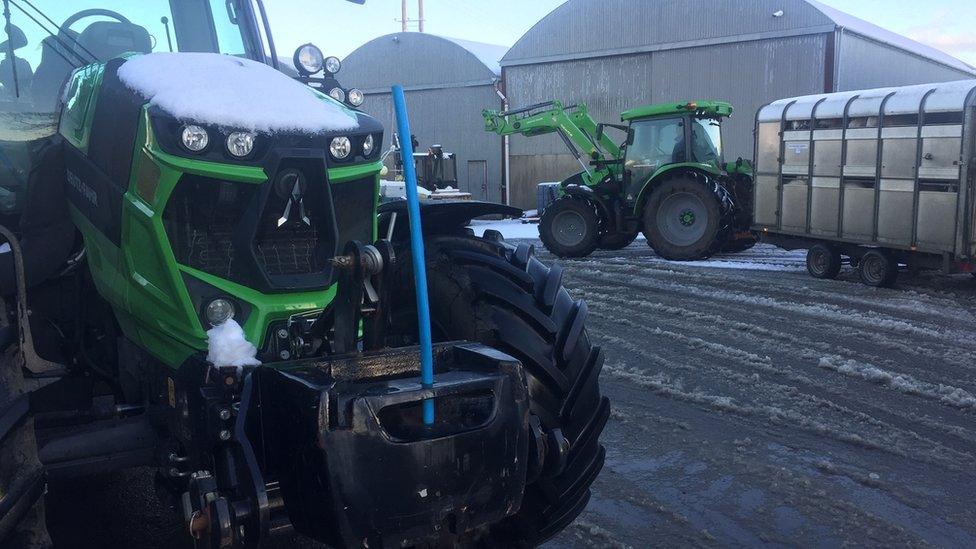
This Ballycastle yard is one of 63 permanent EU-approved export centres in Northern Ireland
Northern Ireland exports about 400,000 lambs to the Republic of Ireland each year for processing or further production.
According to Cormac Healy from Meat Industry Ireland, the loss of that trade could have "huge consequences" for factories in the Republic.
"That runs close to the throughput of an average sheep processing plant so if that is lost you have to expect that with business losses, customer losses and business opportunities lost, there will be implications for the industry here as well," he says.
Like the UFU's Victor Chestnutt, he believes that the implementation of tariffs would also be a "major impediment".
"It would represent a massive part of the overall value of the animal and I think would run to the extent of blocking that trade, or seriously undermining the commercial viability of that business".
It is almost midnight when Drew arrives at the Irish Country Meats plant in Navan.
He hands over the health certificates and helps offload the sheep before beginning the journey home to Donegal, ready to do it all again next week.
- Published10 January 2019

- Published3 January 2019

- Published22 October 2018
